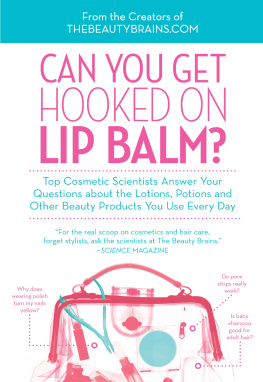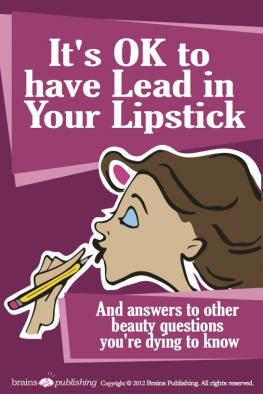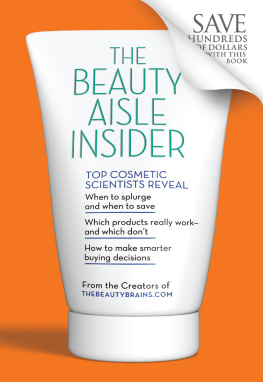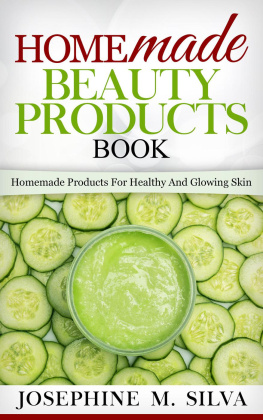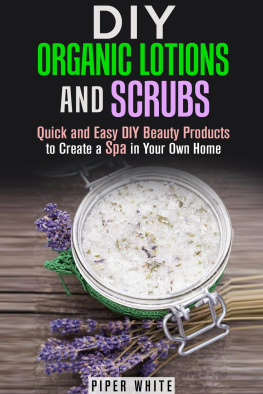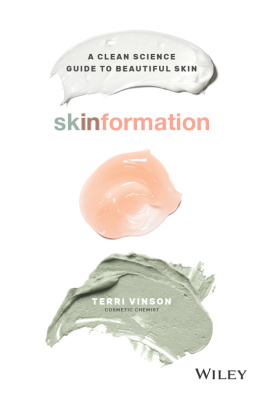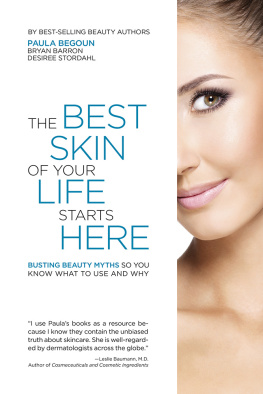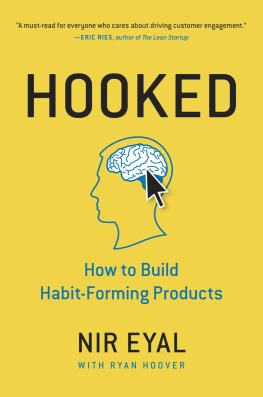Perry Romanowski and the Creators of
THEBEAUTYBRAINS.COM
CAN YOU GET HOOKED ON LIP BALM?
Top Cosmetic Scientists Answer Your Questions about the Lotions, Potions and Other Beauty Products You Use Every Day
To Beauty Brainiacs everywhereyou can be beautiful and brainy
CONTENTS
INTRODUCTION
WHO ARE THE BEAUTY BRAINS?
The Beauty Brains are a group of cosmetic scientists who understand what the chemicals used in cosmetics really do, how products are tested, and what all the advertising means. They have no cosmetics to sell so you can be sure that the information provided is the most unbiased beauty advice available.
LEFT BRAIN
The most hard-core skeptical scientist of all the Beauty Brains, the Left Brain peruses the world of science to bring you the latest developments and explain how they might apply to the cosmetic world.
RIGHT BRAIN
Still scientific, but a bit less militant, the Right Brain has a good eye for the humorousand human interestside of science. The Right Brain is particularly skilled in interpreting advertising claims.
SARAH BELLUM
Sarah works behind the scenes researching questions, reviewing the latest beauty technology and acting as the Beauty Brains guinea pig.
WHATS THE PURPOSE OF THE BEAUTY BRAINS?
There are literally thousands of cosmetic products and companies constantly bombarding you with confusing, and sometimes false, claims. The Beauty Brains was started in 2006 to help women understand the real science behind the beauty products they use every day. We have taken questions from people around the world about all beauty topics, including hair care, skin care, makeup and even cosmetic surgery.
Were here to help you cut through the confusing, misleading and sometimes false information with which the beauty companies bombard you. Our goal is to explain cosmetic science to you in a way thats entertaining and easy to understand. We believe the more information you have, the better youll be able to find products that you like at a price you can afford. So you can listen to the advertising, or advice from a friend, or what your stylist tells you. But if you really want to understand cosmetic products in an unbiased, scientific way, you need the Beauty Brains.
In this book weve collected our best questions and answers to make learning about cosmetic science easy and entertaining. By giving you honest, unbiased information, the Beauty Brains can help you become a smarter shopper so youll be able to get the products you like at prices you can afford.
1. HAIR PRODUCTS FROM SALONS TO STORES
Stylists love to push products but is it really the best idea to buy them? In this chapter, youll learn the truth about whether salon brands are really exclusive to salons, the different types of shampoos that are available and get some straight talk about the most popular hair care brand.
THE SHAMPOO SECRET BEAUTY COMPANIES DONT WANT YOU TO KNOW
Corinne asks: I have a very sensitive scalp with fine hair and suffer from hair loss and dandruff. Dermatologists have advised me to use a clear gel shampoo that is clarifying or deep cleansing. So Ive tried Suave Daily Clarifying Shampoo, Suave for Men Deep Cleaning Shampoo, Neutrogena Anti-residue Shampoo and Prell Classic Shampoo (original formula). Im not happy with those choices and would like you to set me straight. What shampoo is going to work for me?
While we hate to disagree with dermatologists, we dont understand why they recommended a deep-cleansing shampoo when you have dandruff. Deep-cleansing-type shampoos will remove the surface flakes, but only a dandruff shampoo can address the cause of flaking and itching. So wed recommend finding a good dandruff shampoo instead of chasing deep-cleansing, clarifying and antiresidue products. This may seem confusing to you because the beauty companies tell you there are so many different kinds of shampoo. But in reality, every shampoo on the market falls into one of a few basic categories.
THERE ARE ONLY FOUR MAIN SHAMPOO TYPES IN THE WORLD
All shampoo can be categorized by their basic function. So why are there what seem like thousands of products on the market, you ask? Because companies that sell shampoo need new ways to talk about their products to keep them sounding new and exciting. Theres nothing wrong with companies being creative about their names and claims as long as they are honestly depicting what their products can do. But you can be a smarter consumer if you can see beyond the marketing hype and understand the functionality of these four basic shampoo types.
1 Deep cleansing shampoos (a ka volumizing, clarifying, balancing, oil control and thickening ). These shampoos are designed to get gunk off your hair and scalp. They typically contain slightly higher levels of detergents so they foam and clean better. They include the examples above as well as salon products like Paul Mitchell Shampoo and Frederic Fekkais Full Volume Shampoo.
2 Conditioning shampoos (a ka moisturizing, 2-in-1, smoothing, antifrizz, strengthening, color care, straightening and hydrating ). These kinds of formulas are all about leaving a moisturizing agent, like silicone or polyquaternium-10, on the hair to smooth it. They are very good for dry hair, especially if you color-treat or heat-style, but they can weigh down fine hair. Good examples of this type include most of the Pantene formulas and some products from the LOreal Vive collection and Dove Advanced Care.
3 Baby shampoos (a ka kids shampoo and tear-free ). These are milder, lower-foaming surfactant formulas that are designed not to sting or burn your eyes. Theyre better for babies but they dont clean hair as well. Johnsons Baby Shampoo is the classic example, but this category also includes Touch of an Angel and The Little Bath.
4 Antidandruff shampoos (a ka anti-itch, flake control and dry scalp ). These are medicated shampoos that contain a drug ingredient that controls itching and flaking. In the United States these are considered to be over-the-counter (OTC) drugs. Head & Shoulders is the leading dandruff product; other examples include Nizoral Dandruff Shampoo and Redken Dandruff Control Shampoo.
THE BOTTOM LINE
We hope this helps you better understand the marketing hype surrounding shampoo names. Were not saying that all shampoos are the same, or even that all shampoos in a given category type are the same. There are real performance differences so its important for you to shop around and find a product that performs the way you like at a price that you can afford. Just dont get too hung up on the names the companies use to describe their products. Thats the marketing part of the industry, not the science part.
ARE SALON PRODUCTS IN REGULAR STORES THE SAME AS THOSE IN SALONS?
Winnie wonders: Are the salon products that you buy at the local grocery store the same as the ones you can buy at a salon? I saw a news story that said products in stores are fakes.
Salon products are no different than those sold in stores. Selling salon brands in places that arent salons is called diversion. The truth is that these salon brands depend on diverted product to boost their sales. They want to have it both ways. They want to tell you that Paul Mitchell is a salon-only brand, which makes it seem more exclusive, but they also want the high-volume sales that they can get only through mass market outlets like your local Target or Walmart. Additionally, they dont want to anger their salon distributors because people are able to get the same stuffbut cheaperin nonsalon outlets.
They make up this story of products being inferior. In nearly all cases, they are not. Heres how diversion works. Paul Mitchell hires a company to manufacture its products. Then Paul Mitchell salespeople get and fill orders from distributors. Distributors are legitimate businesses that sell directly to independent salons. The distributors can order as much as they want. They then sell it to the salons, which can then sell it to you.

